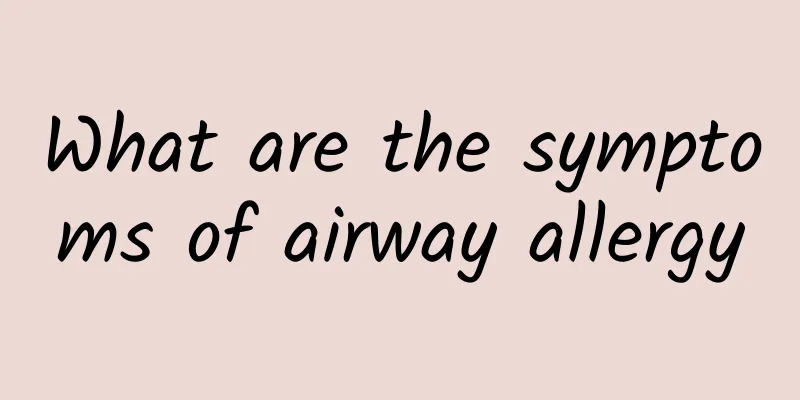What are the symptoms of airway allergy

|
Airway allergy mainly refers to cough variant asthma or allergic bronchitis, which are relatively common airway allergy diseases. When patients have airway allergies, they often cause fever, throat itching, aggravated cough, shortness of breath, and even difficulty breathing, etc., which are particularly harmful to patients. The incidence of this disease in children is also relatively high, mostly due to allergic reasons. Clinical symptoms 1. Not accompanied by fever, but may be accompanied by itchy throat. After the cough is relieved, the patient is like a normal person, and no obvious abnormalities are found in auscultation, X-ray or CT examinations; 2. The onset is often related to the environment or time, such as worsening in the morning and evening or at night, worsening at home and relieving outdoors; 3. It may be aggravated by inhaling cold air, smoke or chemical odors such as paint, dichlorvos, or contacting allergens such as bed dust and dust mites; it may be aggravated after strenuous exercise or laughing; 4. Chronic cough without cause for more than two months, with paroxysmal irritating dry cough or a small amount of white foamy sputum; children may experience nausea or vomiting when coughing severely; 5.40% of patients may have symptoms of allergic rhinitis such as sneezing, runny nose or nasal congestion. Children may also rub their noses and eyes. Many foreign doctors call it allergic rhinitis-bronchitis. Signs 1. Population affected: The incidence rate is higher in children. It has been found that more than 30% of children's dry cough is related to cough variant asthma. In adults, the age of onset of cough variant asthma is higher than that of typical asthma. About 13% of patients are over 50 years old, and it is more common in middle-aged women. (II) Clinical manifestations: Cough may be the only symptom of asthma, mainly a long-term, stubborn dry cough, which is often triggered by inhalation of irritating odors, cold air, contact with allergens, exercise or upper respiratory tract infection. Some patients do not have any triggering factors. It often worsens at night or early morning. Some patients have a certain seasonality in their attacks, mostly in spring and autumn. When patients see a doctor, they have usually already been treated with cough suppressants and expectorants and antibiotics for a period of time, with almost no effect. However, the use of corticosteroids, anti-allergic drugs, β2 receptor agonists and theophyllines can provide relief. (III) History of allergies: The patient may have a clear history of allergic diseases, such as allergic rhinitis, eczema, etc. Some patients can be traced back to a family history of allergies. (IV) Physical signs: Although bronchospasm may occur, it mostly occurs in the small distal bronchi or transient spasms, so wheezing is rarely or not heard during physical examination. |
<<: What are the symptoms of hypoxia in pregnant women?
>>: What are the symptoms of folic acid deficiency?
Recommend
What happens if you have thrombocytopenia? These symptoms may occur
The most common clinical symptom of thrombocytope...
What are the symptoms of internal heat in women?
Regardless of gender, every season or when the se...
What is the reason for bitter mouth in the morning? What is the general cause?
I believe everyone must have experienced the situ...
What are the medicinal values of Hedyotis diffusa?
Oldenlandia diffusa is a common Chinese herbal me...
How to treat spring "irritability"
With the arrival of spring, many people actually ...
What are the ways for people with edema to lose weight?
We often say that someone will gain weight if the...
Uses of mulberry residue after brewing wine
Black mulberry (sāng shèn) is the perfect fruit o...
What are the precautions for vaginal inversion examination?
As female friends grow older, it is necessary to ...
How to judge light menstrual flow
What female friends care about most is their mens...
How to massage Sanyinjiao to achieve the best effect
I believe everyone knows that although medical eq...
Pustules under the nose
Whether male or female, skin diseases are most li...
How to treat dysmenorrhea
With the increase of stress in life and mental pr...
There is a lump behind the ear
The reason for a lump behind the ear may be a seb...
Eat these for breakfast to detox and lose weight
As the saying goes, a year's plan begins with...
Can I have double eyelids during breastfeeding?
It is best not to have double eyelid surgery duri...









